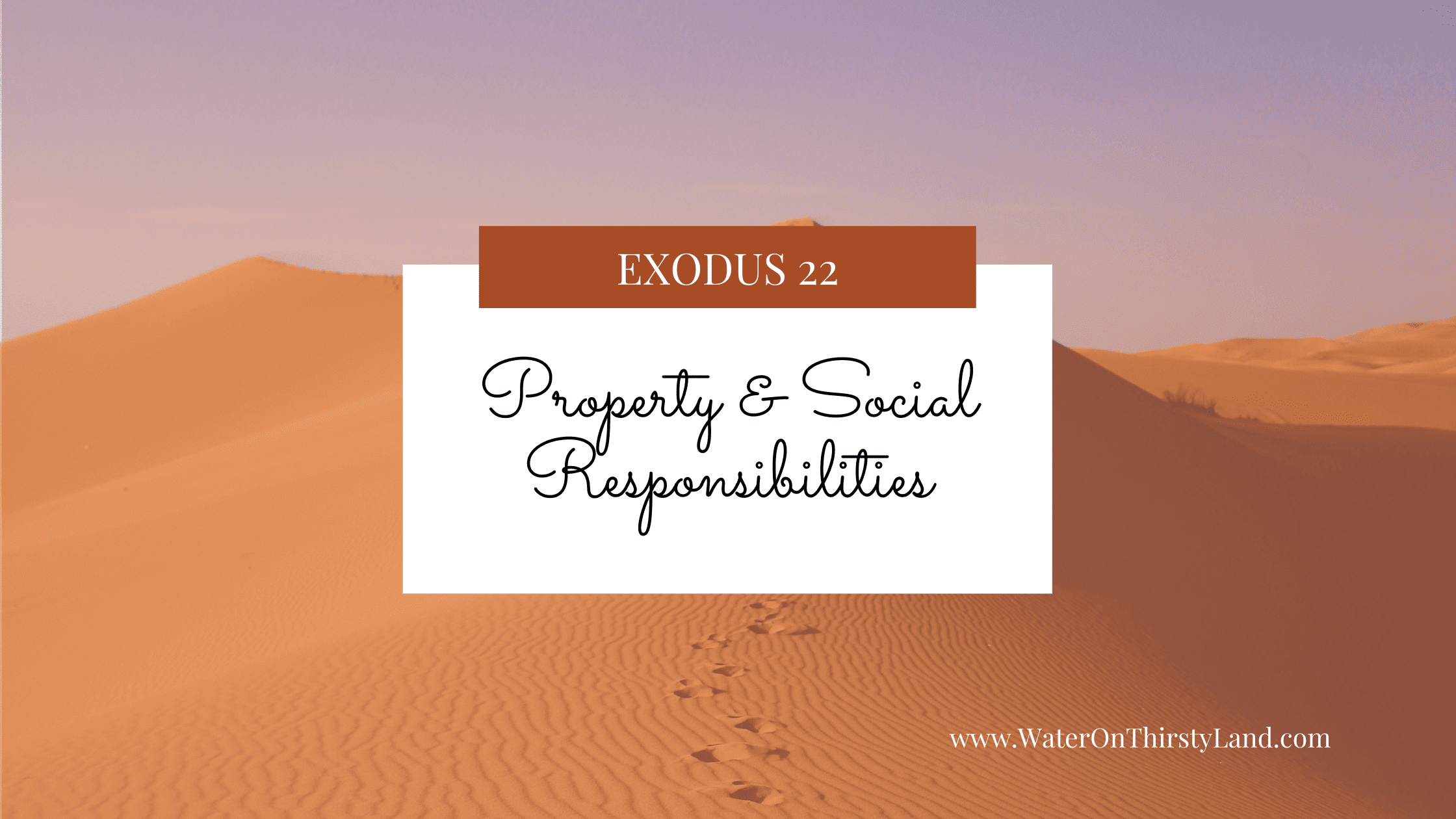So far, we have reviewed how the Israelites were delivered from slavery, the beginning of their journey, the 10 commandments, and now in Exodus 22, we begin to explore additional laws God gave the Israelites about property and social responsibilities.
The book of Exodus is filled with important information about the history of God’s people and the world. It is not only important, but so many of the lessons we can learn are relevant to each one of us as children of God. Dive in as we explore Exodus chapter by chapter.
- Main Themes of the Book of Exodus
- Exodus 1-4: Moses & Aaron
- Exodus 5-9: The Great Plagues
- Exodus 10-13: Passover
- Exodus 14-18: Deliverance
- Exodus 19-21: 10 Commandments
- Exodus 22: Property & social responsibilities
- Exodus 23: Helping others
- Exodus 23: The Annual Feasts
- Exodus 24-30: The Tabernacle
- Exodus 31: The Sabbath
- Exodus 32: The Golden Calf
Exodus 22
Protection of Property
Exodus 22 has many laws about how to handle different situations in their time. God gave very specific laws so that it was easier for His people to develop and maintain a just and stable society. These laws helped them to resolve conflict while still keeping the community unified.
It is important to remember that this was a new community growing into its own. God was laying the foundation for them to start fresh and build a holy community, and the laws set would have been relevant to situations they faced back then.
There is one in particular that really sticks out to me as a confusing law.
‘“If a thief is caught breaking in at night and is struck a fatal blow, the defender is not guilty of bloodshed; but if it happens after sunrise, the defender is guilty of bloodshed… ‘
Exodus 22:2-3
What this means is that if someone gets robbed in the middle of the night, killing the thief is considered self defense. If it happens during the day, it is considered murder. The justification of this is that if a thief is armed and dangerous, it is self-defense if you kill him – but in the dark you cannot tell if he is armed and dangerous. Killing an unarmed thief in the daylight is just plain murder.
Social Responsibility
At this time, arranged marriages were the norm. Fathers would arrange specific marriages for their daughters especially. The husband-to-be would pay a “bride price”, or dowry, to the girl’s father to take her as his wife.
‘“If a man seduces a virgin who is not pledged to be married and sleeps with her, he must pay the bride-price, and she shall be his wife. If her father absolutely refuses to give her to him, he must still pay the bride-price for virgins. ‘
Exodus 22:16-17
If a man slept with an unwed virgin daughter, the girl was considered “damaged goods” because she is no longer a virgin. It would be like stealing from the father because he would now be unable to get the “full bride price” for his daughter. To make up for this “theft” the man who defiled her would have to pay the full bride price to her father.
If the father determined that the man would be able to take good care of his daughter, the man and daughter would marry. If the father determined that the man would not be able to take good care of his daughter he would take payment and keep his daughter. In these cases, it would likely be more difficult to find a good husband for her, even at a lower price, which would cause further hardship for the daughter and her family.
‘“Whoever sacrifices to any god other than the Lord must be destroyed. “Do not mistreat or oppress a foreigner, for you were foreigners in Egypt. ‘
Exodus 22:20-21
God called on His people to treat the foreigners in their community with common decency, but He also called for the destruction of those who worshiped idols in the promised land.
‘and when the Lord your God has delivered them over to you and you have defeated them, then you must destroy them totally. Make no treaty with them, and show them no mercy. Do not intermarry with them. Do not give your daughters to their sons or take their daughters for your sons, for they will turn your children away from following me to serve other gods, and the Lord ’s anger will burn against you and will quickly destroy you. ‘
Deuteronomy 7:2-4
We are to love our neighbors and in loving them we are called to bring everyone to God. Foreigners in the promised land were expected to live by God’s rule. If they did not, then the Israelites were commanded to destroy them for their false idols.
‘When you go to war against your enemies and see horses and chariots and an army greater than yours, do not be afraid of them, because the Lord your God, who brought you up out of Egypt, will be with you. ‘
Deuteronomy 20:1





